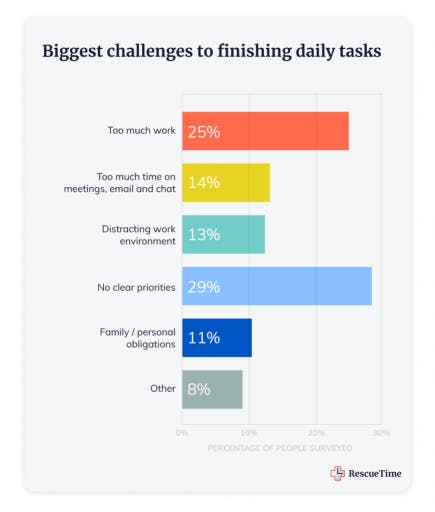I found that whenever I open my PC or whip up my phone to do just one thing, even before I notice it, I'd have already started checking other things like scrolling endlessly through my Twitter timeline before realizing that "Oh! This isn't what I initially set out to do". Often, I feel happy that I am multitasking several activities but didn't know I was harming my productivity.
Researchers have found that every time you multitask, you tend to lose 20% of your overall productivity for each task you try to take on at once! Pause for a little moment and think that through.
Even more, multitasking impacts your cognitive abilities in a severely negative way. While studying those who multitask for about a decade, Professor Anthony Wagner of Standford University found that people who frequently engage with multiple media types at once performed worse on simple memory tasks. According to Professor Wagner,
“There’s not a single published paper that shows a significant positive relationship between working memory capacity and multitasking.”
Another 2010 study by two Harvard psychologists Matthew Killingsworth and Daniel Gilbert, found that
People spend almost 47% of their waking hours thinking about something other than what they’re currently doing.
Rescue Time, a personal and organizational productivity entity, surveyed 850 knowledge workers to put things into perspective. The findings of that survey in terms of productivity were beyond shocking. Only 5% of people say they finish their daily tasks every day. What then competes and robs them of their productive time? The biggest factors mentioned were having too much work to do, not having clear priorities, spending too much time checking emails and chats etc.
As you can see, science doesn't favour multitasking, neither do those who multitask enjoy improved productivity. Why then do people engage in it unrepentantly? It becomes increasingly not hard to tell when you look at that image above a little more critically. No clear priorities ranked highest among other impeding factors as to why those surveyed do not finish their daily tasks. At least we can say that is within your powers. Proper planning and practising singular focus on a task will make the difference.
But before sharing tips on how you can begin the singular focus practice productivity boost, let me share a bit on how that makes a huge difference from multitasking. How deep do you sleep when you have some crucial pending tasks? As for me, I barely sleep deep cos I find myself in the subconscious thinking about the pending tasks. And how does that impact my cortisol level (stress hormone)? I wake up feeling like going back to sleep as I am always tired.
How about creatives (writers, designers or even programmers)? How does singular focus help them? A 2015 neuroscience study shows that
Creative people have greater connections between two brain areas typically at odds: the brain network of regions associated with focus and attentional control and the brain network of regions associated with imagination and spontaneity.
Managing both parts of the brain takes mastery which demands focus. Hence, creative writers, software programmers, or designers need to be intentional in approaching and finishing off tasks. So how do you practice singularity of focus?
Brutally get rid of distractions. Your phone is most likely the biggest source of distraction for you. How many time do you think you switch between apps and websites in a day on average? The answer is at least 300 times. And what about checking your email. Rescue Time's research found that an average person checks his or her chat/email every 6 minutes. Keep your phone(s) away and while doing that, ensure you do not have those distraction triggering apps installed on your computer. If they are, ensure you turn off notifications to reduce the tendency of being distracted.
Use your calendar to structure your day. Recently, I spoke with one of my friends still in the university. I found that his grades weren't okay, and I had to advise him to turn them around. One of the things I told him was to employ his Google calendar to set goals and see that he follows them through. He even shared the link with me for accountability to help put him in check should he start slacking again. I do the same. I already have my calendar filled with daily activities from My Coding Classes to Writing Sessions, Time for my Startup and, of course, uninterrupted moments with family. The bottom line is this, use that simple calendar app to set goals and structure your day.
Take breaks between sessions. Don't try to act Voltron finishing one task and jumping straight up to the next. You'll experience burn out and subsequently abhor your plans. Give yourself meaningful breaks. For instance, I learn coding every day for five hours at a stretch. After that, I jump straight to my writing sessions, right? You bet not. I take a walk, listening to some nice àṣá or Lindsey Stirling's tunes. I always feel refreshed and energized to write better or even continue my foreign language lessons. Whatever works for you, just do it!
You have to be intentional as I have made up my mind to this subject of the singularity of focus. Becoming a spectacular developer, designer or writer takes constant practice. While at it, don't fall into the category of people who spend almost 47% of their waking hours thinking about something other than what they’re currently doing
Feel free to connect with me on Twitter
